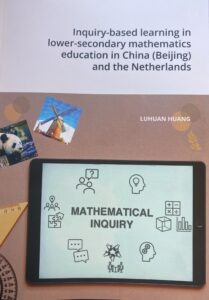IBL (en wiskunde) in China en Nederland

Luang Huang, China |
Proefschrift 2022
Universiteit Utrecht |
|
Inquiry-based learning (IBL) emphasizes learning through experiencing and constructing.
Results from this study seems to show that mathematics teachers may not have a complete understanding of IBL and the IBL cycle. |

|
Abstract
Mathematics is considered to be a human activity and students should actively participate in the learning process. These features are fostered in inquiry-based learning (IBL). IBL is interpreted as a teaching approach that invites students to learn in similar ways as how mathematicians work. The understanding and practices of IBL might be impacted by teaching cultures, of which those in East Asia and the West are considered to be remarkebly different and have led to prototypes. This study tries to move beyond those sterotypes and explored the current situations of IBL in mathematics education. China, specifically Beijing, and the Netherlands were taken as examples of two teaching cultures. Perspectives of students, teachers, textbooks and classroom practices were explored.
Results from this study seems to show that mathematics teachers may not have a complete understanding of IBL and the IBL cycle, thus they often do not include the full IBL cycle or involve high-level IBL in their teaching. This is possibly also related to the lack of abundant opportunities for IBL present in textbooks.
Part study
Inquiry-based learning (IBL) emphasizes learning through experiencing and constructing. Where IBL is often applied in science education, the conceptualization of IBL practices in mathematics education is less obvious. We compared students’ reports on IBL practices in two different teaching cultures as an attempt to better understand IBL practices in connection with overarching teaching cultures. In this study, we investigated IBL practices in lower-secondary mathematics lessons in the Beijing area and the Netherlands through a survey about the experiences and preferences of 858 Chinese students and 441 Dutch students.
Results show that students from the Beijing sample reported experiencing IBL activities in most mathematics lessons, while students from the Dutch sample reported them in some lessons, and both preferred the same amount of IBL activities as they experienced. The Dutch sample reported little experience with posing questions to tackle. The study also suggests a correlation between IBL experience and IBL preference of each class: students with more IBL experience are likely to show a higher preference for IBL activities. Results of this study do not confirm expectations based on stereotypes about the two teaching cultures. The students’ perspective in both samples suggests that providing complex problems and organizing group work have potential for further encouraging IBL in mathematics.
Verwijzingen
- Huang, L. (2022). Inquiry-based learning in lower-secondary mathematics education in China (Beijing) and the Netherlands. Utrecht: Utrecht University.


